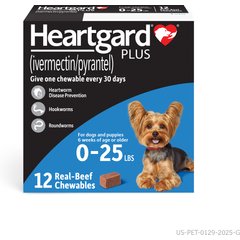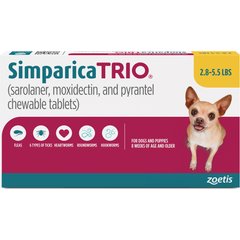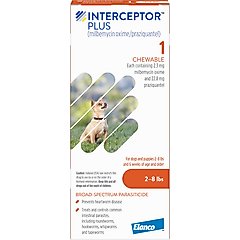What Are Heartworms in Dogs? Symptoms, Prevention, and More

Photo by kontrymphoto/iStock/Getty Images Plus
Heartworms in dogs, also known as canine dirofilariasis, is a dangerous and scary parasitic infection that no pet parent ever wants their furry friend to have. Unfortunately, heartworms are a prevalent disease that poses a constant threat to all dogs year-round.
The good news: There are several highly effective ways to prevent a heartworm infection from occurring in the first place. And even if a dog becomes infected, they can be successfully treated.
We spoke with veterinary experts to learn more about heartworms, including what heartworm disease is, its causes, symptoms of worms to watch for, treatment options, and prevention methods.
What Is Heartworm Disease?
Heartworm disease is a serious condition that can result in hundreds of worms in a dog’s body and be fatal if left untreated. Heartworms are parasitic roundworms that live and reproduce in the heart and blood vessels of dogs, says Amy Attas, VMD, founder of mobile veterinary practice City Pets: The House Call Vets in New York City.
These worms are transmitted when certain mosquito species carry an immature form of the parasite Dirofilaria immitis from feeding on one dog’s blood and bite another dog. Once bitten, the dog becomes infected with the parasite larvae, which eventually enter their bloodstream, Dr. Attas says.
When the larvae reach the heart and the surrounding blood vessels, they can mature into adult worms and reproduce, with the resulting microfilariae (microscopic worms) circulating in the bloodstream. These long, slender worms, which resemble cooked spaghetti, are usually a foot in length and live in the pulmonary arteries and the heart of infected animals, causing substantial damage to the lungs and heart.
“The life cycle of this parasite requires the dog species, as dogs are the definitive hosts for this parasite,” Dr. Attas says. “Although heartworms can be found in other mammalian species, they cannot complete their life cycles without a dog.”
Dogs, cats, ferrets, and non-domestic canids (e.g., coyotes, foxes, wolves) can get heartworm disease. Heartworm disease has been diagnosed in all 50 states and can occur all over the world. However, Dr. Attas says, its prevalence can vary depending on:
- Climate: The risk of heartworm transmission is higher in warmer climates with large mosquito populations, such as tropical and subtropical areas.
- Seasonality: Because seasonality will also affect mosquito populations, the potential for infection is greater in the warmer months of the year in certain places.
It’s also hypothesized that dogs relocated from subtropical locations carrying microfilariae may be responsible for bringing the parasite to new climates, she notes.
Because there are plenty of common myths about heartworm disease, Dr. Attas shares a few facts about heartworms to inform pet parents about this serious disease.
- Heartworms live in the blood vessels, not in the intestinal tract.
- Dogs cannot clear heartworm infections without treatment.
- Heartworm infections occur in all 50 U.S. states, not just southern states.
- Garlic and other herbal methods are insufficient mosquito repellents.
Causes of Heartworms in Dogs
As if worrying about pests like fleas and ticks wasn’t bad enough, we also have to watch for mosquitoes. Infected mosquitoes are carriers and transmitters of heartworm disease, Dr. Attas says. There are at least 70 species of these bloodsuckers that ingest microfilariae, an immature stage of heartworm, when they feed on an infected animal, she explains.
Dr. Attas breaks down the heartworm life cycle in dogs and what happens in each cycle:
- Once inside the mosquito, the microfilariae develop into the third-stage heartworm larvae known as L3. The L3 infectious larvae are transferred to another dog through the puncture wound made by the mosquito when it bites the animal during a blood meal.
- These larvae travel under the skin through subcutaneous tissue and muscle of the newly infected animal over several weeks and progress through additional life stages.
- The larvae then enter the bloodstream and make their way into the pulmonary arteries, which carry blood from the heart to the lungs.
- Within the pulmonary arteries over the next six to seven months, they mature into adult worms. The male and female adult worms can mate, and the females will release microfilariae back into the bloodstream. These microfilariae can then be picked up when a mosquito bites the infected dog, ready to be spread to the next dog bitten by the mosquito … and the life cycle of the parasite continues.
Signs of Heartworms in Dogs
Dogs with heartworm disease may experience the following clinical signs:
- Mild or excessive coughing
- Loss of appetite/weight loss
- Lethargy
- Weakness
- Difficulty breathing
According to the Merck Veterinary Manual, there are four stages of heartworm infection in dogs:
- Stage 1: Minimal to no signs
- Stage 2: Mild to moderate signs, usually a persistent cough
- Stage 3: Severe signs, such as respiratory signs, weight loss, exercise intolerance, and heart failure
- Stage 4: Caval syndrome, a life-threatening syndrome that can result in sudden death; dogs may have pale gums, dark urine, and can collapse without warning.
How To Treat Heartworms in Dogs
Once a dog has been diagnosed with a heartworm infection, they must be treated. Otherwise, the parasites will cause damage to the cardiovascular system, Dr. Attas says.
“The earlier it’s detected, the better the chances that the animal will recover,” says Bianca Zaffarano, DVM, associate clinical professor emeritus at the Hixson-Lied Small Animal Hospital at the Iowa State University College of Veterinary Medicine. “The longer the infection goes, the greater the worm burden and the more difficult the recovery.”
The American Heartworm Society recommends a three-drug protocol for heartworm treatment:
- Heartworm prevention: When a dog is diagnosed with heartworm disease, they are immediately given a macrocyclic lactone preventive. This kills the existing larvae before infecting the melarsomine (for adult worms) and prevents new infections from other mosquitoes.
Some dogs can develop an anaphylactic reaction after the microfilariae start to die off, so it’s important to start heartworm prevention with veterinary supervision. Dogs with positive microfilaria tests are often prescribed steroids and/or antihistamines to protect them from adverse reactions.
- Doxycycline: This antibiotic is given orally to infected dogs for 30 days to kill a bacteria, Wolbachia, that lives symbiotically inside the heartworm and is essential for the worm’s survival, Dr. Attas says. The medicine’s anti-inflammatory properties can also treat the inflammation that occurs when the worms die within the dog’s blood vessels, she adds.
- Melarsomine: Attas explains this arsenic-like heartworm medicine for dogs is given by injection to kill the adult worms. Three injections are required, with the first two separated by one month and the third given 24 hours after the second. “During the entire course of melarsomine treatment, the dogs must be kept very quiet to prevent cardiac complications,” she says. “Occasionally, sedation is required.” Pet parents should also restrict exercise and keep dogs calm for six to eight weeks following the last melarsomine injection.
“Actual heartworm treatment—the injections and limiting the dog’s activity and the adjunct steroids—goes to day 91, and then there are follow-ups with testing through day 365,” Dr. Zaffarano says. “That’s a full year that you’re involved.”
Dr. Attas says patients must be kept on a continuous course of FDA-approved macrocyclic lactone medication as prescribed by your vet, such as Interceptor™ Plus, Heartgard®, or Simparica Trio™.
Ultimately, your vet will come up with the best treatment plan tailored specifically for your dog based on their individual needs.
Recommended Products
Heartworm Prevention for Dogs
While heartworms is a prevalent disease in dogs, it can be prevented. It’s also easier to prevent than it is to treat. The American Heartworm Society recommends that all dogs over the age of 7 months get blood work done to check for heartworm disease.
There are two types of blood tests, Dr. Attas says, including:
- The microfilaria test, which looks for circulating microfilariae (immature heartworms)
- The antigen test, which identifies “occult” infections (i.e., that there may be female worms, but they’re not producing microfilariae)
“Dogs in endemic areas should have both antigen and microfilaria screening done annually,” Dr. Attas says. “In general, annual testing is an integral part of ensuring that prophylaxis is achieved. If an infection is diagnosed during annual testing, timely treatment can be initiated to minimize cardiovascular pathology (damage to the heart and surrounding blood vessels).”
Chest X-rays and a full blood panel are other tests that may be recommended to not only determine the severity of heartworm disease but to also make sure a dog is healthy enough to receive treatment.
She shares more tips on how to prevent heartworm disease in dogs, including:
- Avoid contact with mosquitoes. Try to keep your pet inside during peak mosquito time, such as dusk. Clear any standing water from your property.
- Use a preventive treatment monthly, as this is a highly effective way of killing immature heartworms to prevent them from developing into adult heartworms.
- Use monthly prevention year-round. It’s possible for a dog to become infected with heartworms after missing just one dose of prevention.
- Schedule annual checkups for dogs, including those on heartworm prevention. Heartworm testing can help detect potential infections early on so dogs can begin treatment promptly.
Learn more about the different types of heartworm medications for dogs.
FAQs About Heartworms in Dogs
What are the first signs or symptoms of heartworms in dogs?
The first signs of heartworm disease are exercise intolerance, weakness, rapid breathing, coughing, decreased appetite, and weight loss, Dr. Attas says. However, dogs with early heartworm disease may not have any symptoms at first.
Can heartworms in dogs be cured?
Yes, a heartworm infection can be effectively treated. However, there may be residual damage to a dog’s cardiovascular system, Dr. Attas says. Dogs must be kept on monthly prevention so that immature heartworms injected by an infected mosquito don’t cause a heartworm infection.
How long can a dog live with heartworms?
This depends on how early the disease is detected, the severity of the infection, and the dog’s overall health, Dr. Attas says. Over time, untreated dogs will sustain damage to their heart and lungs.
How do dogs get heartworms?
“Heartworms are transmitted to dogs from the bite of a mosquito carrying an immature form of the parasite Dirofilaria immitis,” Dr. Attas explains. “The larvae eventually enter the dog’s bloodstream and can mature to adult worms in the heart and surrounding blood vessels.”
Heartworms are one of several common types of parasites in dogs to watch for. And though it can be stressful to think about the serious health risks they pose to our beloved canine companions, prevention combined with annual vet visits are essential to helping make sure our dogs stay happy and healthy for many years to come.
Expert input provided by Amy Attas, VMD, founder of the mobile veterinary practice City Pets: The House Call Vets in New York City; and Bianca Zaffarano, DVM, associate clinical professor emeritus at Hixson-Lied Small Animal Hospital at the Iowa State University College of Veterinary Medicine.
This content was medically reviewed by Chewy vets.






